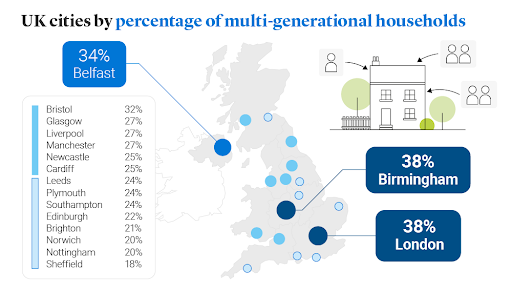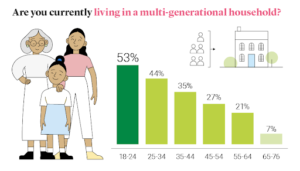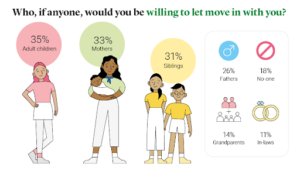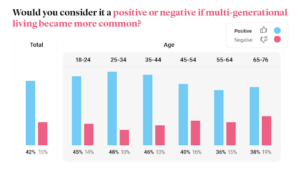- 30% of adults in the UK live in a multi-generational home, rising to 53% for 18–24-year-olds
- London and Birmingham have the highest number of multi-generational households, with 38% of respondents living in a multi-generational household.
- 46% of older millennials (35–44-year-olds) living in multi-generational households attribute their living arrangements to the cost-of-living crisis.
As the UK sees an increase in adult children living at home, with ONS data revealing that the number of families with adult children living at home rose by 13.6% from 2011 to 2021, Legal & General surveyed over 2,000 UK adults to uncover their perspectives on life under one roof.
Who are the UK adults living in a multi-generational household?
The survey revealed that overall, 30% of UK residents live in a multi-generational household, with men tending to stay living in the family home more (32%) compared to women (27%).
London and Birmingham ranked as the UK cities with the highest rates of multi-generational living, with 38% of respondents living in the same home with two or more adult generations.
In the UK, 53% of 18–24 year-olds live in multigenerational housing, the highest percentage of all age groups surveyed. The second highest age group in multigenerational households were 25–34 year-olds (44%). This trend is driven by soaring rents and increased living costs, making it difficult for young adults to afford to live independently.
Reasons behind multigenerational living today
16% of people in the UK live in multi-generational households due to cultural traditions and expectations. This is most common among 25-34 year-olds (24%) and in the South East of England, where 27% of respondents live in multi-generational households.
Finances play a key role in multi-generational living, as independent living and running a household can be expensive. The cost-of-living crisis has led 67% of respondents to see multi-generational households as necessary, with 40% citing it as the main reason for living in a multi-generational household.
The survey reveals that respondents living in Northern Ireland (55%), the North-West (46%), and Greater London (44%) were most likely to cite the cost-of-living crisis as the reason they live in a multi-generational household.
Legal & General’s recent Bank of Family research also revealed many young people are opting to live at home to save money for a deposit, staying an average of three years. The research estimates allowing family members to live at home whilst saving for a property deposit results in an average rent saving of £32,600.
The study also revealed that the ‘Bank of Family’ is expected to gift a record £9.2bn this year to help loved ones buy a home, with the report estimating average contributions of £27,400.
Attitudes towards living with family
The Under One Roof study found that in contrast to those embracing multi-generational living, 18% of respondents would not be willing to let any family member move in with them, with more men (22%) than women (15%) opposed to the idea of living with family.
When it came to the family members most likely to move in, ‘adult children’ aged 18 and above were the most welcome. 51% of 65 – 76-year-olds, the age group likely to have adult children, were also the most likely to let their adult children live with them for support.
The recent Bank of Family research from Legal & General revealed that more than a third (35%) of relatives have welcomed adult family members to live with them rent-free, with a further 39% open to providing similar support to their adult children in the future.
Only 11% of participants would be open to having their in-laws move in with them. Grandparents fared slightly better, with 14% of respondents open to having them move into the same household as them. The survey revealed that Gen Z adults (18- to 24-year-olds) are the most likely to live with a sibling, and 48% of respondents were open to the option, which is ideal for splitting the costs.
Overall, 42% of respondents see multi-generational living as positive, compared to 15% who view it negatively. 48% of 25–34-year-olds have a favourable view of living with multiple generations, perhaps seeing it as a way to save money whilst being close to their family.
Nearly half (46%) of women see the closer family bonds as the main advantage of multi-generational living, while 55% of older respondents (65–76 years old) value assistance with elderly care.
Respondents in Edinburgh had the highest percentage of adverse reactions towards multi-generational living, whereas 59% of respondents in Plymouth had the most positive response within the UK.
How moving back in with family helped Andrew get on the property market
Andrew Dennis, a 28-year-old Financial Reporting Oversight Supervisor, bought his first home in Abercynon, near Cardiff, for £123,000. To save for the deposit, he moved back to his parents’ house in Pontyates, a village near Llanelli, during lockdown. He stayed for about a year, saving around £12,000 by cutting back on rent and commuting costs. Andrew did not receive any direct financial support from his parents, relying solely on his work salary and utilising the Help to Buy ISA to help him get on the property ladder.
Paula Llewellyn, Chief Customer and Strategy Officer at Legal and General comments:
“As the UK faces rising living costs and evolving lifestyle habits, our study reveals how financial pressures, cultural expectations, and family bonds shape multi-generational living. Britons value the benefits of shared households, reflecting a broader shift towards intergenerational support and adaptability in modern living arrangements.”

| [donate]
| Help keep news FREE for our readersSupporting your local community newspaper/online news outlet is crucial now more than ever. If you believe in independent journalism,then consider making a valuable contribution by making a one-time or monthly donation. We operate in rural areas where providing unbiased news can be challenging. |























